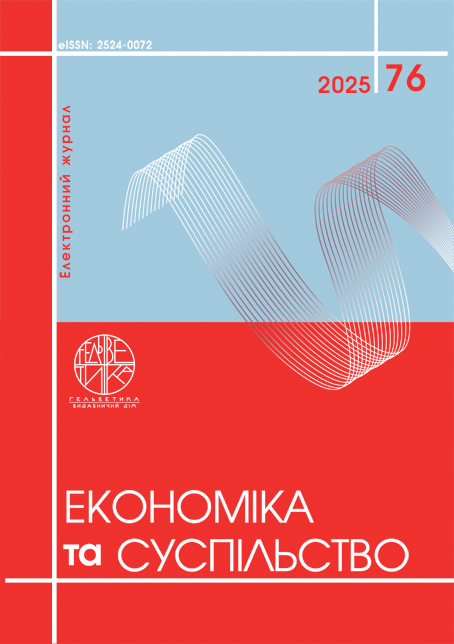CHAONOMICS AS A TOOL FOR ENHANCING THE QUALITY OF ENTERPRISE PERFORMANCE ASSESSMENT IN THE CONTEXT OF POST-WAR DEVELOPMENT
Abstract
This article is dedicated to the concept foundations and the practical usefulness of Chaonomica as an emerging interdisciplinary approach in enterprises’ economic and management. Chaonomica is positioned as an extension of Behavioural Economics and created to overcome the limitations of conventional economic and managerial tools in environments characterised by heightened instability and powerful shocks. In particular, the article focuses on the applicability of Chaonomica to the assessment and enhancement of industrial enterprise performance in the context of post-war recovery and development. The main objective of Chaonomica is the development of analytical and formalised instruments capable of capturing and quantifying the presence of chaos influence, defined as systemic, multidimensional, and nonlinear disruptions, within organisational and macroeconomic systems. The study describes Chaonomica as an alternative identifying instrument of traditional performance evaluation frameworks under crisis conditions, highlighting their insufficiency in accounting for the unpredictable and destabilising forces that increasingly shape modern market dynamics. The research underscores the necessity of formalising behavioural economic postulates through quantifiable indicators. It introduces the chaos coefficient as a novel metric to assess an enterprise’s resilience to internal and external crises. Findings suggest that the explicit incorporation of chaos-related variables into enterprise diagnostics enhances the effectiveness of managerial and investment decision-making. Furthermore, the chaos coefficient was developed as a research tool for identifying the most stable indicator under internal and external influences. We also discovered that the most stable object chaos coefficient is nearly “one”. This indicator can also become one of the basic indicators for the development of Ukraine’s post-war strategy and export discipline. Results of our research are helpful for big enterprises, investors, state governance and as a theoretical discipline for students.
References
Mankiw N.G. Principles of Economics. USA: Cengage, 2022. 816 p.
Shcherban T., Bretsko I., Korolovych O., Shtykh I. & Havrylets O. Psychology of Risk in Economic Decision-Making Under Martial Law: Evidence from Ukraine. Peace Economics, Peace Science and Public Policy. 2025. DOI: https://doi.org/10.1515/peps-2024-0053
World Bank Open Data. URL: https://data.worldbank.org/ (дата звернення 13.07.2025).
Баранов В.В. Роль поведінкової економіки в розумінні прийняття економічних рішень. Академічні візії. 2024. № 28. С. 1-14. DOI: https://doi.org/10.5281/zenodo.10691679
Біла І. С. Поведінкова економіка в державному регулюванні бізнесу. Економіка та суспільство. 2024. №65. DOI: https://doi.org/10.32782/2524-0072/2024-65-51
Індекс Мінфін. URL: https://minfin.com.ua/ (дата звернення 13.07.2025).
Передало Х.С., Огерчук Ю.В., Лібенко Ю. С. Поведінкова економіка та можливості застосування технік її впливу в сучасних організаціях. Ефективна економіка. 2019. №12. DOI: https://doi.org/10.32702/2307-2105-2019.12.94
Поведінкова економіка: від теорії до практики : міждисциплінарний навчальний посібник. / за науковою ред. к.е.н., доц. І.Л. Татомир, к.е.н., доц. Л.Г. Квасній. Трускавець : ПОСВІТ, 2022, 408 с.
Талер Р. Поведінкова економіка. Як емоції впливають на економічні рішення. Київ : Наш Формат, 2018. 464 с.
Хаос. URL: https://slovnyk.ua/index.php?swrd=хаос (дата звернення 13.07.2025).
Mankiw, N.G. (2022). Principles of Economics. USA: Cengage. 816 p.
Shcherban, T., Bretsko, I., Korolovych, O., Shtykh, I. & Havrylets, O. (2025). Psychology of Risk in Economic Decision-Making Under Martial Law: Evidence from Ukraine. Peace Economics, Peace Science and Public Policy. DOI: https://doi.org/10.1515/peps-2024-0053
World Bank Open Data. URL: https://data.worldbank.org/ (accessed July 13, 2025).
Baranov, V. (2024). Rol povedinkovoi ekonomiky v rozuminni pryiniattia ekonomichnykh rishen [The Role of Behavioural Economics in Understanding Economic Decision-Making]. Academic Visions. no. 28, pp. 1-14. DOI: https://doi.org/10.5281/zenodo.10691679 (in Ukrainian)
Bila, I.S. (2024). Povedinkova ekonomika v derzhavnomu rehuliuvanni biznesu [Behavioural Economics in State Regulation of Business]. Economy and Society. no. 65. DOI: https://doi.org/10.32782/2524-0072/2024-65-51 (in Ukrainian).
Index Minfin. URL: https://minfin.com.ua/ (accessed July 13, 2025) (in Ukrainian).
Peredalo, Kh.S., Oherchuk, Yu.V., Libenko, Yu. S. (2019). Povedinkova ekonomika ta mozhlyvosti zastosuvannia tekhnik yii vplyvu v suchasnykh orhanizatsiiakh [Behavioural Economy and Possibilities of its Influence Techniques Application in Modern Organisations]. Efektyvna ekonomika. no. 12. DOI: https://doi.org/10.32702/2307-2105-2019.12.94 (in Ukrainian).
Tatomyr, I. L., & Kvasnii, L. H. (Eds.). (2022). Povedinkova ekonomika: vid teorii do praktyky: mizhdystsyplinarnyi navchalnyi posibnyk [Behavioural economics: From theory to practice: an interdisciplinary textbook]. Truskavets: POSVIT. (in Ukrainian)
Thaler R. (2018). Povedinkova ekonomika. Yak emotsii vplyvaiut na ekonomichni rishennia. [Misbehaving. The making of behavioral economics]. Kyiv: Nash Format, 464 p. (in Ukrainian)
Chaos. URL: https://slovnyk.ua/index.php?swrd=хаос (accessed July 13, 2025) (in Ukrainian).
Copyright (c) 2025 Віктор Нам’ясенко

This work is licensed under a Creative Commons Attribution 4.0 International License.


